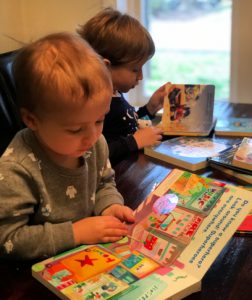By April Wallace, nwaMotherlode Early Childhood Editor
Late last year I began to notice that Elliott, my youngest son, wasn’t picking up words as fast as he should have. It was bizarre, a realization I didn’t anticipate.
That summer as we left the doctor’s office for our boys’ well-checkups, I was filled with warm anticipation for Elliott (18 months at the time). I really expected that his language would start picking up faster and faster from that point.
On the drive back home I happily daydreamed about our next visit, in which I was sure he would be speaking more and more words, and more confidently at that. That’s how it happened with his big brother, after all.
For Henry, 18 months was this magical threshold. After that, it was like he walked away from every story-time, meal, bath or playtime with a new sound or a new word. It was all so much fun—for him and for us.
But with Elliott, I kept waiting and waiting for that moment.
Is this “normal”?
At first I didn’t worry because logically I knew all children develop differently, and all the milestone books and resources suggest you “wait and see.” Not to mention our sons’ pediatrician judged our self-reported list of his utterances (at 18 months) as already well ahead of the curve.
Then a few months later, a little bump in vocab at 21 months made me think he was taking off. But as we got closer and closer to his second birthday, it had obviously plateaued. It seemed like he wasn’t trying so much anymore.
I got discouraged in my efforts to help him. We read books all the time. We talked to him about what objects were around us and what we were doing. But I was also painfully aware of what was different.
Unlike Henry, Elliott had to compete for air time. Henry talks constantly. And without any childcare during the pandemic, it’s been hard to carve out one-on-one time with each of the boys.
Just by being the youngest in the family, Elliott was at a disadvantage and mostly without an uninterrupted chance to speak, to really, really try.
What was I to do? First, I needed to know whether there was an actual delay or if I was just seeing a difference in my children’s personalities. Henry, we knew, is outgoing, but Elliott is more selective about people he interacts with. Could that be all?
Getting evaluated
We still had a month to go until the 2-year appointment when I started shopping for a speech therapist. I began with a well known office in our town that had a good reputation according to a family member, but which had recently changed hands. Fair enough.
One 20 minute phone call to them confirmed that my son could definitely benefit from speech therapy. I scheduled a speech evaluation right away, hoping we could bring the results to our pediatrician and start the bureaucratic process of diagnoses, prescriptions, checking insurance policies so we could settle on an action plan for Elliott right away.
But that’s where it gets tricky.
At 23 months, not even 2 years old, the metrics would all be off doing an evaluation before his birthday. So we waited an extra week so the results would be “official,” or more complete and accurate.
Because my ordinarily reserved toddler did not express (say things out loud) much to this therapist in person, she  felt unable to actually evaluate him. The experience frustrated me after having hung my hopes on getting some answers, and it saddened and confused me that I was getting nowhere. How could I help my child if a speech therapist could not clearly tell me where he was developmentally, or keep a positive demeanor in telling me that he would improve with therapy?
felt unable to actually evaluate him. The experience frustrated me after having hung my hopes on getting some answers, and it saddened and confused me that I was getting nowhere. How could I help my child if a speech therapist could not clearly tell me where he was developmentally, or keep a positive demeanor in telling me that he would improve with therapy?
The valuable thing we gained from the evaluation was to realize a disconnect between what medical doctors and speech language pathologists consider words.
Counting words, after all, is the metric by which most parents begin to judge whether their children’s speech is typical. So to understand that we were doing it differently than an SLP would intend was a bit startling.
The pediatrician considered any noise made in deliberate reference to a person, object, etc. a word. If it allowed him to communicate something that we understood, he counted it.
But from the speech therapist’s perspective Elliott’s words were mainly environmental noises, such as when he said beep beep to mean car, for example. So she didn’t consider many of his “words” as words.
With that big turning point in our pocket, we moved on.
Getting diagnosed
We brought the first speech therapist’s concerns to our pediatrician during the two-year checkup. By then my husband and I had worked ourselves into a frenzy. Why wasn’t he talking in the way we were led to expect? Was he autistic? Could he be non-verbal? Did we do something wrong, not give him enough attention or tools to learn?
Our pediatrician asked lots of questions, observed Elliott thoughtfully and eased many of our fears. No, he’s not autistic or nonverbal. Clearly he understands us and responds with eye contact and obviously communicates in other ways.
Elliott had said many words over the course of his life, if not always consistently, and by this point he’d been putting a couple of words together here and there, and that was really the only verbal achievement the pediatrician would look for medically.
If left up to our kids’ doctor, he would not put Elliott in speech therapy based on what he saw, but he trusted that we knew what we were talking about. If he was not trying to speak very much, if there was a change, then sure. It would not hurt to put him in speech therapy.
We got our prescription, and we moved on to finding a speech therapist we all would feel more comfortable with. We called another recommended by a friend, and this new therapist said we should first determine whether we qualify for a state-based program.
Where to begin
Most insurance policies don’t cover speech therapy for children below the age of 3, we were told. So first we reached out to the Washington County representative for First Connections, a state-funded early intervention program for children with delays in speech, occupational and/or physical abilities. We received an orientation on the program and were told Elliott would be scheduled for two evaluations, one for speech and one for OT/PT, since one delay often coincides with the other. If he qualified, the cost of services would be free or reimbursed until he reached the age of 3.
Both Benton and Washington County representatives spoke with us, and each had different ideas about whether an independent evaluation would help. One said it would save time, while the other said it would be more confusing in the long run.
A 25 percent delay would qualify Elliott for free speech therapy services until the age of 3. But we were also told that the evaluation would be scheduled within 6 weeks.
I waited 6 weeks for the program to make their arrangements because I didn’t want to make anything more complicated. But after waiting that long and still hearing nothing, I went ahead and scheduled a formal speech evaluation with the independent speech therapist of our choice.
No one seemed to be concerned about all the time slipping away that could be used for teaching and guiding my child. “He’s still very young, another couple of months is not going to make a huge difference,” we heard over and over. But I, frankly, disagreed.
I scheduled that formal evaluation, which in this case turned out to be a 90-minute play session designed to test Elliott’s total communication abilities—not just through words, but everything. And then we waited 3 more weeks for the results.
The results did not include a percentage of delay, so we would never know exactly if he would qualify for state assistance. But it did tell us some useful information.
It confirmed a couple things we knew. His receptive language, or his understanding of what we say to him, was through the roof, well above his age level. And it told us his ability to express was behind what’s typical for his age—yes, yes, that’s why we’re here. It clued us in on the fact that his social skills were a bit delayed too, but not alarmingly so.
Most importantly, we got that assurance that he would almost certainly improve quickly due to his ability to understand so well.
Getting started
Of course once this was all squared away, then the state program got back to us. They were ready to schedule the two evaluations. But by then we knew our insurance would cover enough of the speech therapy to make us comfortable going forward already rather than start all over again.
Finally, four and a half months after I set out to get my son in speech therapy, we were able to begin and actually attend a session.
Looking back, I’m glad I stuck to my guns about getting Elliott evaluated, even though every single person we encountered said it was early, early, so, so early and don’t worry, don’t worry, don’t worry. Partially because the process of getting him situated with a speech therapist took so much longer than I anticipated, but also because his particular type of delay would go undetected in broad strokes, and will not improve without explicit instruction.
This time, that mama intuition served me well and now the real work can begin.
⋅⋅⋅⋅⋅⋅⋅⋅⋅⋅⋅⋅⋅⋅⋅⋅⋅⋅⋅⋅⋅⋅⋅⋅⋅⋅⋅⋅⋅⋅⋅⋅⋅⋅⋅⋅⋅⋅⋅⋅⋅⋅⋅⋅⋅⋅⋅⋅⋅
Info on early speech therapy
The prevalence of speech sound disorder in young children is 8-9 percent. By the first grade, roughly 5 percent of children have noticeable speech disorders. The majority of these speech disorders have no known cause. —NIH.gov
Between 70-80% of Late Talkers seem to catch up to their peers by the time they enter school. We can make a difference for Late Talkers by helping them as early as possible. Early language intervention can increase their odds for long-term success in language, literacy and other important areas. —The Hanen Centre (Hanen.org)
During the first three years of a child’s life, their brain grows at the most rapid rate than it ever will again in their life. The best way to build a strong foundation for future learning is by talking with them. —Wee Talkers.com
 April Wallace is a stepmom to one smart, funny teenager, mama to two beautiful and curious baby boys and wife to a very kind and generous man. She spent the past decade as a news reporter, sometimes lifestyle writer, and recently left her job at the Arkansas Democrat-Gazette to be with her babies while they’re still babies. When she gets a few minutes to herself, April loves to run local trails and read fiction. For more of April’s posts on pregnancy, babies and toddlers, click here.
April Wallace is a stepmom to one smart, funny teenager, mama to two beautiful and curious baby boys and wife to a very kind and generous man. She spent the past decade as a news reporter, sometimes lifestyle writer, and recently left her job at the Arkansas Democrat-Gazette to be with her babies while they’re still babies. When she gets a few minutes to herself, April loves to run local trails and read fiction. For more of April’s posts on pregnancy, babies and toddlers, click here.
